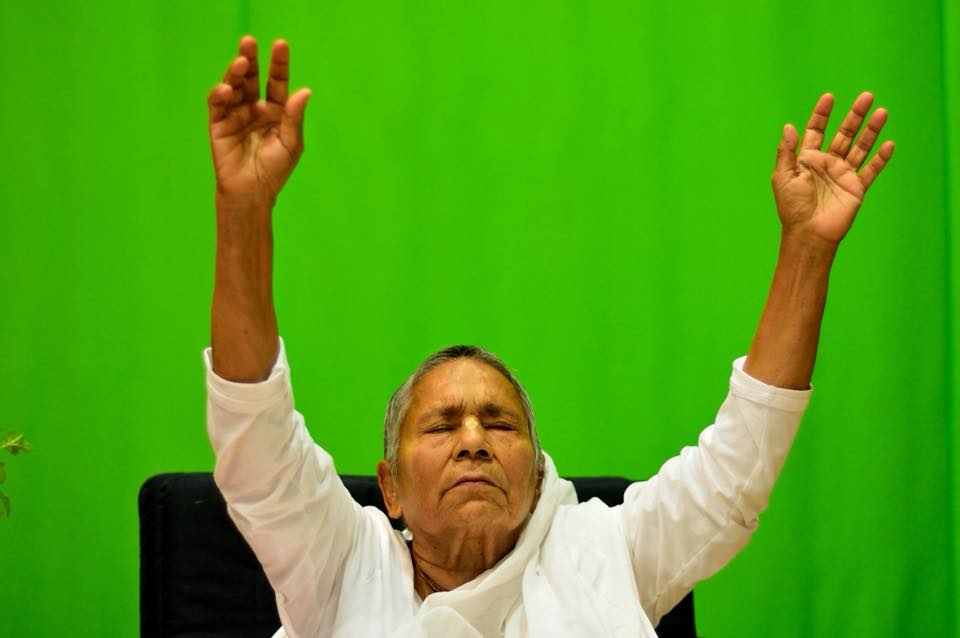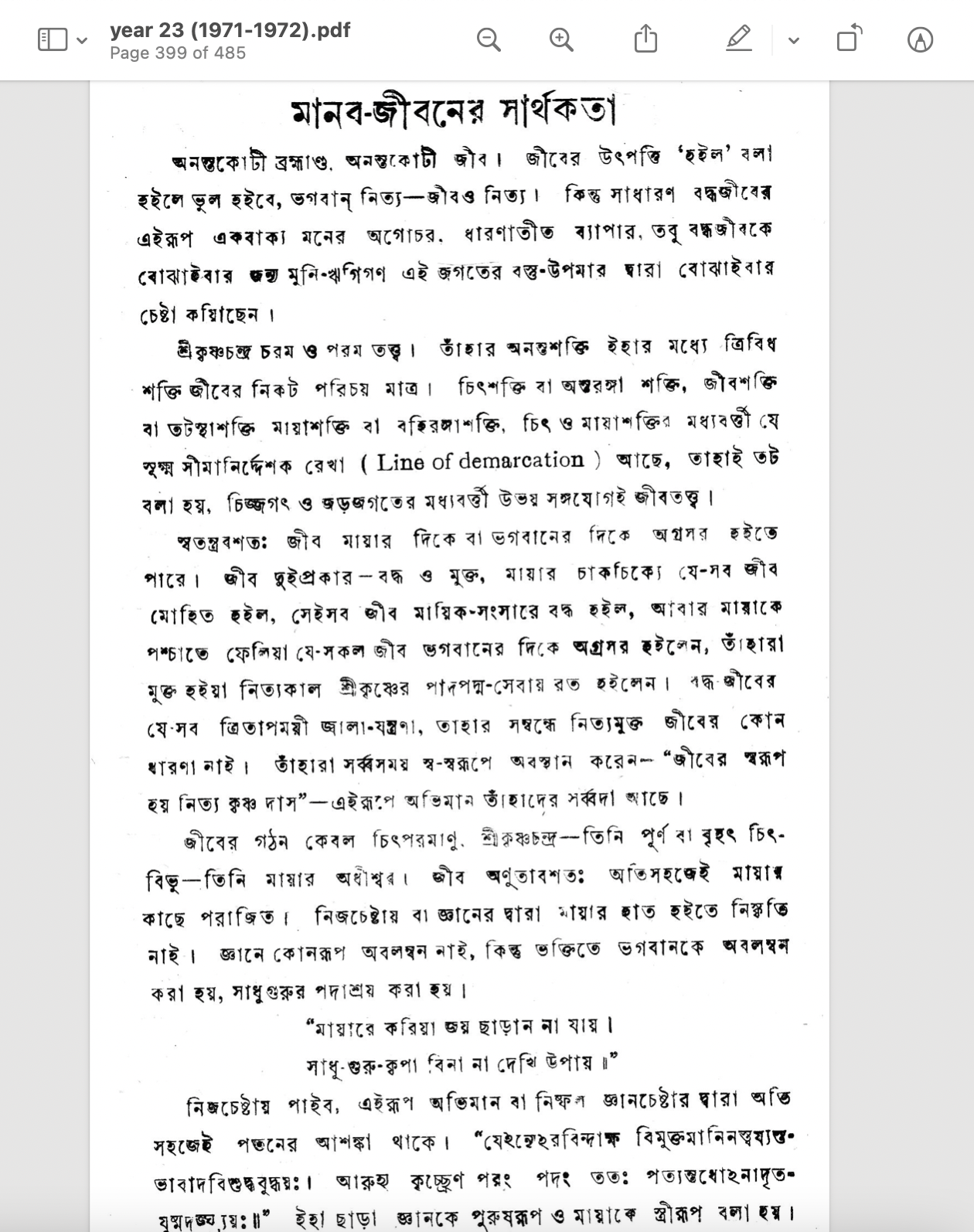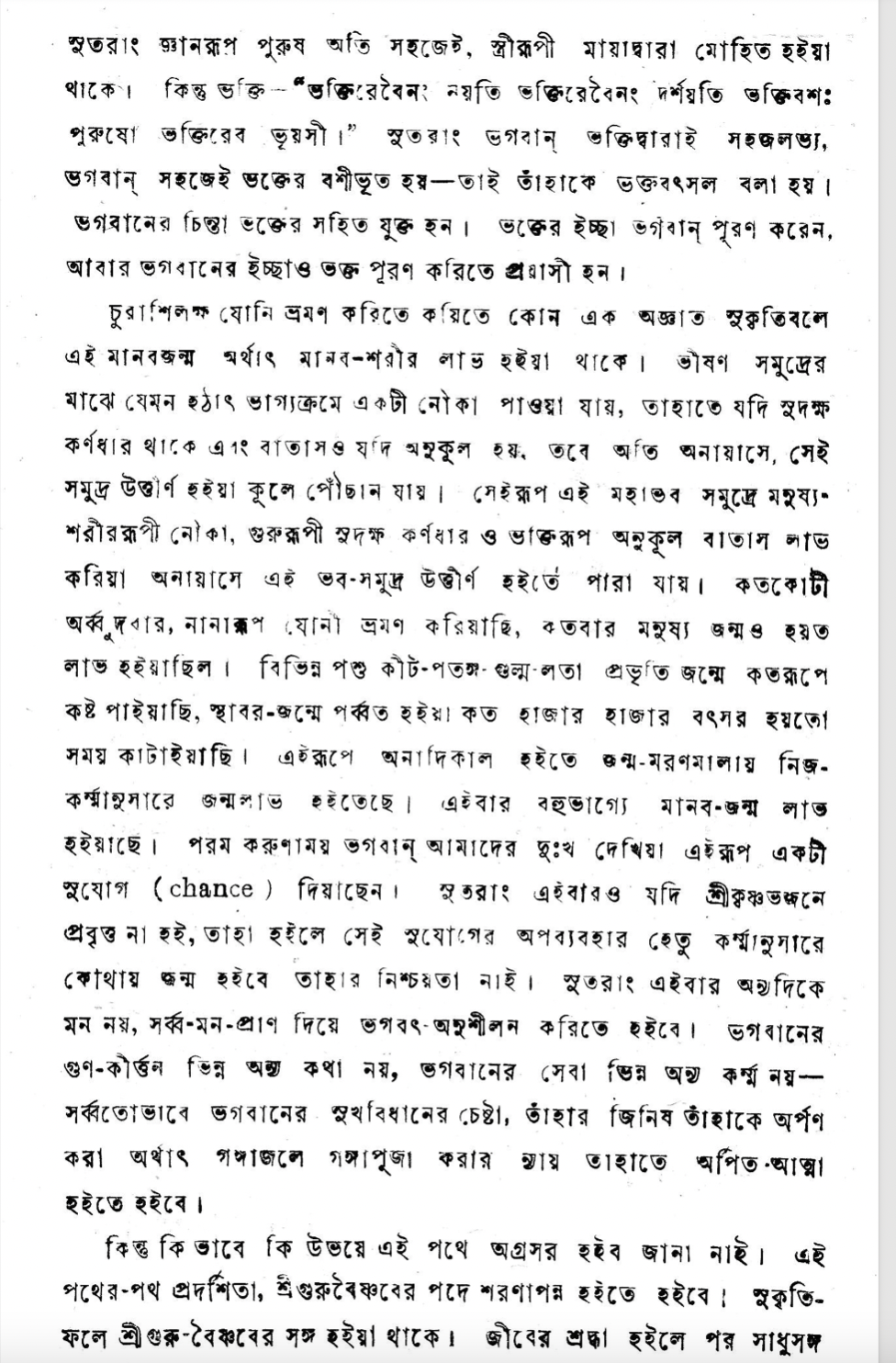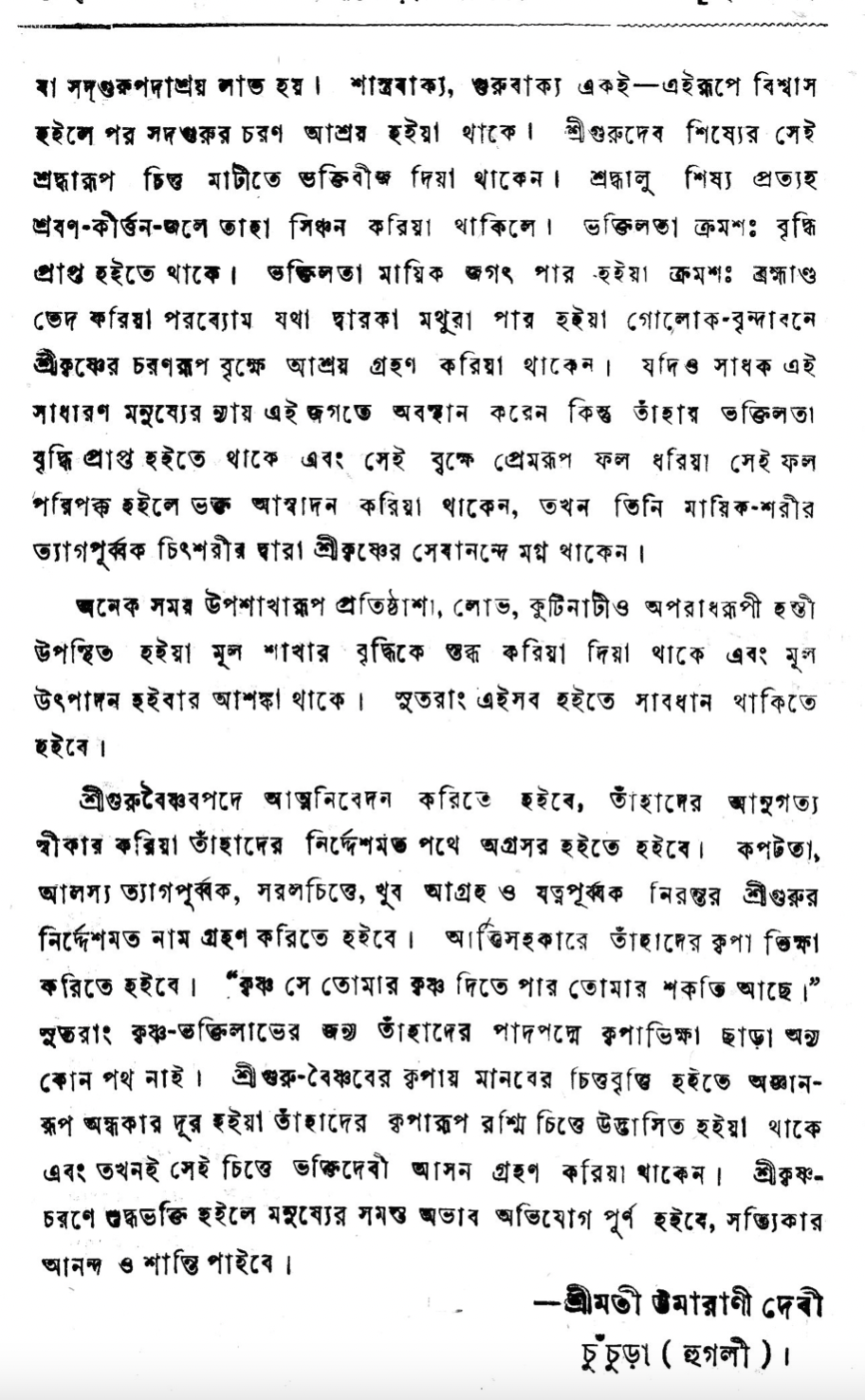The Purpose of Human Life
"Therefore, if this time also we do not start performing bhajana of Śrī Kṛṣṇa, there is no knowing where we might be born according to our karma for having misused this opportunity."

Infinite millions of universes, infinite millions of jīvas (souls). To say the jīvas came into being would be a mistake, for as Bhagavān (God) is eternal, so too are the jīvas. But for ordinary embondaged souls, this sort of singular statement is beyond the grasp of the mind, something beyond comprehension, which is why the sages and seers have tried to explain such things to the conditioned souls by drawing analogies from the objects of this world.
Śrī Kṛṣṇacandra is the ultimate and supreme tattva. He has infinite potencies, of which the souls know definitively only three: (1) the cit-śakti, or antaraṅga-śakti (internal potency), (2) jīva-śakti, or taṭasthā-śakti (the marginal potency), and (3) māyā-śakti, or bahiraṅgā-śakti (the external potency). The subtle line of demarcation between cit and māyā-śakti is called the taṭa (shoreline). Jīva-tattva is the midway convergence of the spiritual and material realms.
By their own independent will, the souls can advance toward māyā or toward Bhagavān. The jīvas are of two types: baddha (embondaged) and mukta (liberated). All the jīvas enchanted by the glitter of māyā have been bound in illusory existence, whereas all the jīvas who left māyā behind and advanced toward Bhagavān were liberated and became eternally engaged in the service of Śrī Kṛṣṇa’s lotus feet. Eternally liberated souls have no concept of all the threefold sufferings experienced by embondaged souls. They are forever situated in their original identities—“jīvera svarūpa haya kṛṣṇera nitya-dāsa – The constitutional nature of the soul is as the eternal servant of Kṛṣṇa”. This is the identity they possess for all time.
The jīva is by composition strictly a particle of spirit (cit-paramāṇu). Śrī Kṛṣṇacandra is the full or mega spiritual sovereign (bṛhat cit-vibhu). He is the master of māyā. Because of their finitude, the jīvas are very easily overcome by māyā. There is no escape from māyā’s clutches by their own efforts or knowledge. In jñāna (knowledge), there is no support, but in bhakti Bhagavān can be adopted as a support, and one can take shelter at the feet of a bona fide guru.
“māyāre kariyā jaya chāḍāna nā jāya |
sādhu-guru-kṛpā binā nā dekhi upāya ||”
“I will achieve by my own efforts.” In this sort of egotism or futile pursuit of knowledge, there is risk of very easily falling down. “Ye ’nye ’ravindākṣa vimukta-māninas-tvayy asta-bhāvādaviśuddha-buddhayaḥ | āruhya kṛcchreṇa paraṁ padaṁ tataḥ patanty adho ’nādṛta yuṣmad añghrayaḥ || – O lotus-eyed Lord, those who think themselves liberated and amuse themselves with speculative knowledge fall down from their so-called supreme positions, which are achieved by strenuous austerities, because of their impure consciousness resulting from having no regard for Your lotus feet.” [ŚB 10.2.32] Besides this, jñāna is referred to as male, whereas māyā is female. Therefore, the masculinity of knowledge is very easily enchanted by the femininity of māyā. However, in regard to bhakti, it is stated: “Bhaktir-evainaṁ nayati bhaktir evainaṁ darśayati bhakti-vaśaḥ puruṣo bhaktir eva bhūyasī | – Devotion leads the Supreme Lord. Devotion reveals Him. The Supreme Person is under the control of devotion. Hence bhakti is greater than Him.” [Māṭhara-śruti] Thus, Bhagavān is easily attainable via bhakti alone. Bhagavān easily comes under the control of the devotees. That is why He is called “Bhakta-vatsala – affectionate to the devotess”. Bhagavān’s thoughts and concerns are linked to His devotees. Bhagavān fulfills the desires of the devotees, and the devotees in turn strive to fulfill Bhagavān’s desires.
After roaming and roaming through eight million four hundred thousand species of life, by dint of some unknown sukṛti (devotional merit), one attains this human birth, this human body. If in the midst of the ocean one were to fortuitously chance upon a boat and the boat had an expert captain and the winds were favourable, then one could easily cross that ocean and reach its shore. Similarly, if in this great ocean of material existence one obtains the boat of the human body, the expert captain that is guru, and the favourable winds of bhakti, one can easily cross over this ocean of material existence. For how many tens of millions of births have we explored various species of life? How many times have we already had human birth? Just think of all the suffering we have faced as animals, insects, worms, plants, creepers, etc. Perhaps we have been immobile species too, like mountains, spending thousands and thousands of years like that. Thus, since time immemorial, we have been taking birth according to the fruits of our actions in this cycle of birth and death. This time, by great fortune, we have attained human birth. Supremely merciful Bhagavān has seen our suffering and given us this one happy chance. Therefore, if this time also we do not start performing bhajana of Śrī Kṛṣṇa, there is no knowing where we might be born according to our karma for having misused this opportunity. Therefore, this time, with our mind not in any other direction, we must give all our mind and soul to bhagavat-anuśīlana. No other kathā except for Bhagavān’s guṇa-kīrtana, no other activity except for Bhagavān’s service—striving to please Bhagavān in every regard, offering Him what is His, like worshipping the Ganges with Ganges water, we will have to offer our souls unto Him.
But we do not know how, by which means, to advance on this path. We will have to surrender at the feet of those who illuminate this path—Śrī Guru and Vaiṣṇavas. The association of Śrī Guru and Vaiṣṇavas is gained as a result of sukṛti. If the jīvas develop śraddhā (faith), then they attain sādhu-saṅga, or shelter at the feet of a sad (bona fide) guru. The statements of scripture and the statements of guru are one. If one develops this kind of conviction, then one can take shelter at the feet of a sad-guru. Śrī Gurudeva sows the seed of bhakti in the earth of the disciple’s faith. The faithful disciple daily irrigates that seed with the waters of hearing and chanting. The bhakti-latā (vine of devotion) then gradually starts to grow. The vine of bhakti surpasses this illusory realm and eventually penetrates through the universal covering. From there, it progresses beyond Dvārakā and Mathurā and takes refuge upon the tree that is the feet of Śrī Kṛṣṇa in Goloka Vṛndāvana. Though the sādhaka remains in this world as an ordinary human being, his bhakti-latā continues to grow and, upon that tree, bears the fruit of prema, which the devotee relishes when it is ripe. Then the devotee relinquishes his illusory body and becomes immersed in serving Kṛṣṇa via his transcendental body.
Often many weeds like greed, duplicity, and the desire for prestige sprout around the main plant and stunt its growth, or the elephant of offenses appears, threatening to uproot the plant altogether. One has to be very cautious of all these impediments.
One must surrender one’s soul at the feet of Śrī Guru and the Vaiṣṇavas. One has to accept their guidance and advance along the path as per their instructions. Giving up deceit and laziness, with a simple heart, great enthusiasm and endeavour, one must chant nāma as per Śrī Guru’s instructions. With anguish and longing, one must beg for their mercy. “Kṛṣṇa se tomāra kṛṣṇa dite pāro tomāra śakati āche | – Kṛṣṇa is yours; you have the power to give Kṛṣṇa.” Thus there is no other way to attain bhakti for Kṛṣṇa than to beg at their feet for their mercy. By the mercy of Śrī Guru and the Vaiṣṇavas, the darkness of ignorance will be dispelled from the human being’s heart, the rays of their mercy will flood his consciousness, and then only will Bhakti Devī, the Goddess of Devotion, assume her seat therein. If one develops pure devotion for Śrī Kṛṣṇa, then all the scarcities and struggles of human life will be fulfilled and one will obtain true bliss and peace.
—Śrīmatī Umā-rāṇī Devī
Chunchura (Hooghly)



